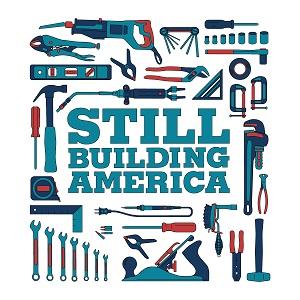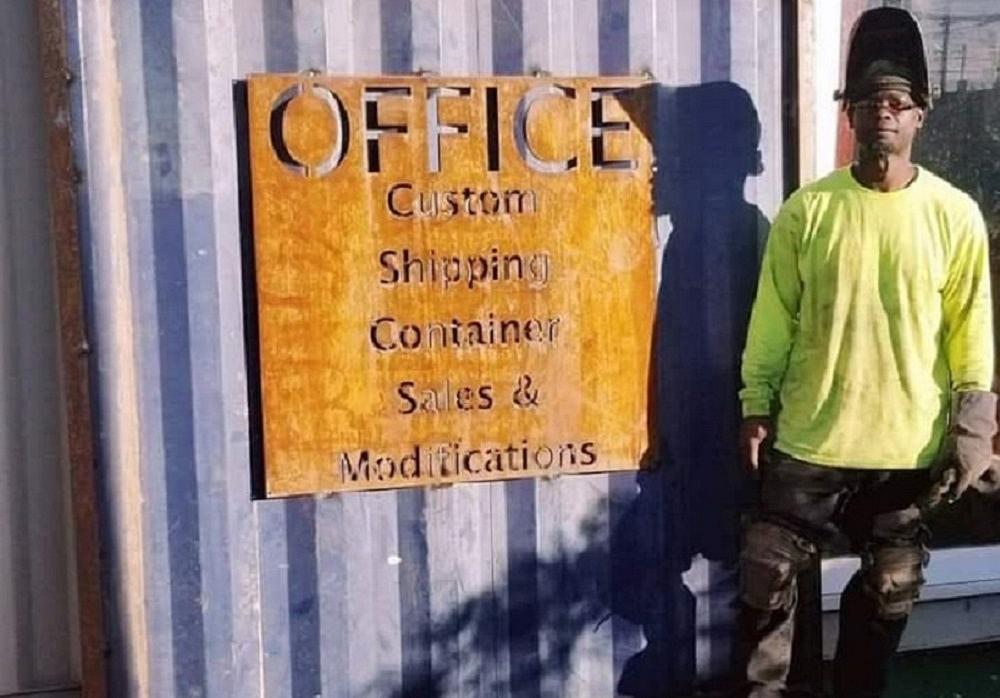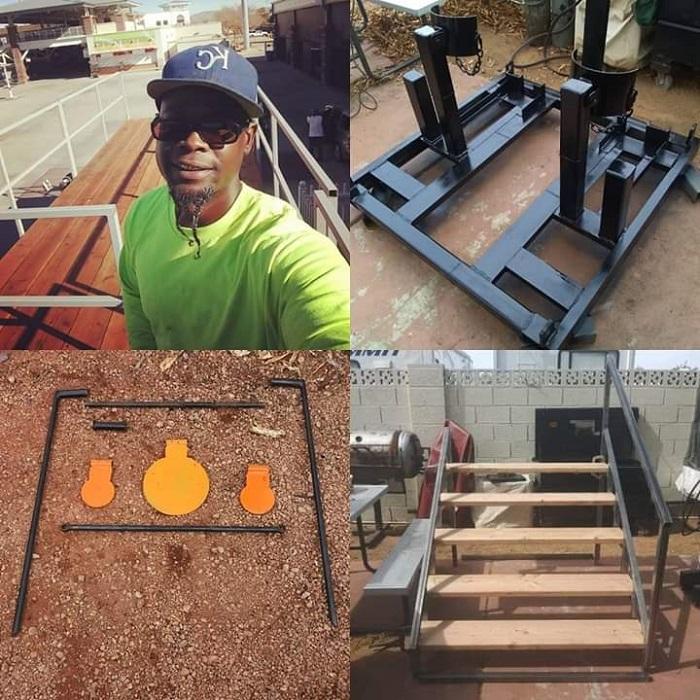- FMA
- The Fabricator
- FABTECH
- Canadian Metalworking
Categories
- Additive Manufacturing
- Aluminum Welding
- Arc Welding
- Assembly and Joining
- Automation and Robotics
- Bending and Forming
- Consumables
- Cutting and Weld Prep
- Electric Vehicles
- En Español
- Finishing
- Hydroforming
- Laser Cutting
- Laser Welding
- Machining
- Manufacturing Software
- Materials Handling
- Metals/Materials
- Oxyfuel Cutting
- Plasma Cutting
- Power Tools
- Punching and Other Holemaking
- Roll Forming
- Safety
- Sawing
- Shearing
- Shop Management
- Testing and Measuring
- Tube and Pipe Fabrication
- Tube and Pipe Production
- Waterjet Cutting
Industry Directory
Webcasts
Podcasts
FAB 40
Advertise
Subscribe
Account Login
Search
Still Building America: Saved by combining a love of welding and music
How one metal fabricator turned his life around in prison to launch a welding business in Phoenix
- By Darla Welton and Josh Welton
- February 22, 2020
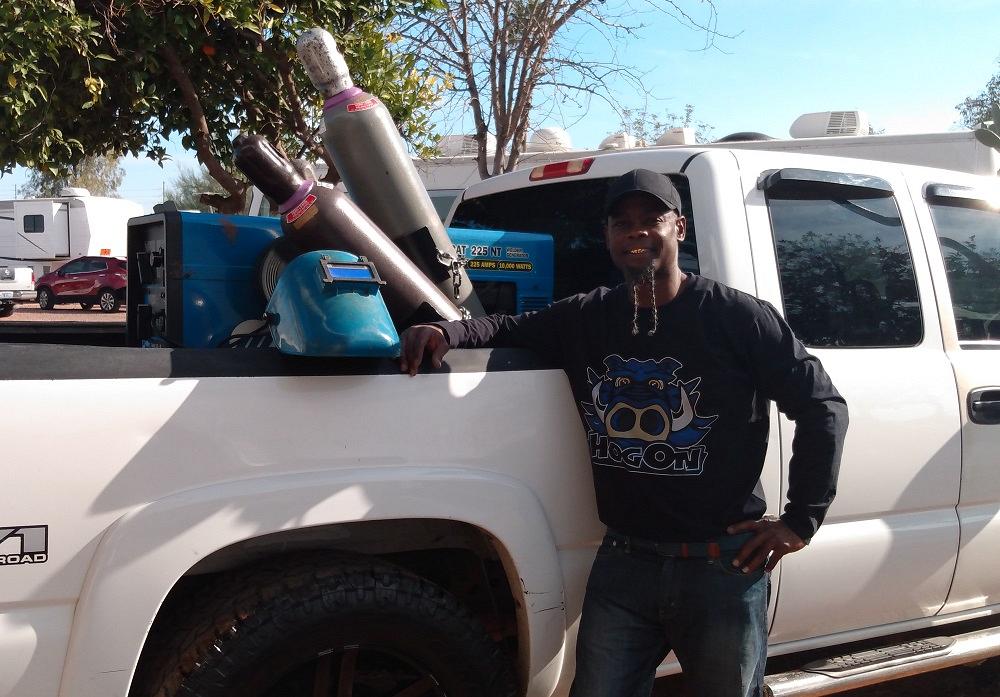
Welder, fabricator, ironworker, and rapper Joe Brown launched Hog On Welding in Phoenix following a decade in Arkansas prison, where he turned his life around by completing a welding program. Images provided by Joe Brown
Joe Brown began life’s journey down a bumpy road.
But with guidance from his mom and educational opportunities offered during a decade of incarceration, his path was set straight. In the years since his release from prison, Joe built up his welding career and launched a successful business, Hog On Welding, in Phoenix. Now the 39-year-old welder, fabricator, ironworker, and rapper is combining his welding and music passions to teach younger people how to start a business, earn a good income as a welder, and use that income to support a music career.
It’s all about helping others find success and maintain their freedom and independence in order to accomplish their dreams. Joe said, “I share my story with anyone who's willing to hear it. I was told that as I learned I should drop seeds because I never know who might come behind me, and then use what I planted and take it to the next level.”
Darla Welton: Share with us the kind of work you do at Hog On Welding.
Joe Brown: Right now I fabricate custom containers, along with other fabrication fieldwork, modifications, repairs, and installations. I'm an outside person so I enjoy mobile repair jobs and being out in the field. I'm always saying that field welding is not shop welding. You have to think outside of the box and think on your feet. I'm good in the field and I'm good in the shop, which makes me an asset. I started my independent LLC, Hog On Welding, after working for a company and seeing the difference between being an employee and being a boss. I learned a lot about fabrication, ironwork, millwright work, and welding, but after gaining experience I left the company and started doing my own thing independently.
DW: What does “Hog On” mean?
JB: “Hog On” is an acronym and stands for “honoring our generation ornamental nature.” Life is full of obstacles and we must learn to overcome them and face them to get to the next level in life. I had to hustle over grounded obstacles naturally, and I've formed it to create a movement for the underdog.
DW: How did you determine your career path?
JB: I decided on my career path in prison, while being incarcerated as an adolescent. By the age of 13 I caught my first felony, at 14 I was initiated in the organization called Gangster Disciple, and by 15 I had dropped out of school and been charged with several felonies. Prison or death was the next step for me. Luckily, prison devoured me before death did. At the age of 16, I faced a possible life sentence due to charges stacked up against me. I received a 14-year sentence under the 70% law, where I would do approximately 10 years of my life in the Arkansas Department of Corrections.
My mom came down to visit me at the Corrections Facility in Arkansas when I was 17. She asked if I thought about what I wanted to do once I was released and suggested welding opportunities, thinking that I might be good at it. She sent me some information from the local library, and while I didn’t get a chance to start welding until a few years later, I knew it was what I wanted to do. I was 22 years old when I was able to get inside of the combination welding program in prison and completed the program in 2004.
DW: Your mom definitely deserves some praise for helping you find a way to make money as a welder!
JB: My mom, Mary Catherine Brown (nickname “Cat”), was my greatest influence, as she gave me the direction of welding when I was incarcerated. I did a decade of my life in a cell, from 16 to 26 years old. It's a lot of time to listen, learn, and plan for the future. During that time I embraced that welding and fabrication would be my future. My mom said she knew that welding could provide income like I was used to from the streets. I was raised with hustlers. All we knew was fast money.
DW: What other type of training have you undertaken over the years?
JB: While in prison I completed my GED, took college courses, and went to vo-tech. The way that the Arkansas correctional system was set up during the Bill Clinton era gave me a hand-up. There was a mess of young African American kids who had been charged as adults and the system offered free education to us. I took advantage of my time incarcerated. I took a yearlong college course on small business management that taught me how to set up a business. I went to Riverside Vocational Technical School in Grady, Ark., for 14 months. So once I was released from prison, I wasn't like the average person just looking for a job. I actually had a career. More recently, in 2015, I earned my NCCER ironworker journeyman card. I have cards in MSHA and OSHA training. And I’m an AWS-certified welder.
DW: What is your favorite part of your welding career?
JB: My favorite part of welding is controlling the weld puddle and fabrication. I enjoy creating and putting things together. I like to invent my own products and help others with their products and equipment.
DW: What sort of life opportunities has welding brought to you?
JB: Welding allowed me to make my first $100,000 in one year. And I was able to travel from the East coast to the West coast of the U.S. on someone else's money! So that was awesome. Travel gave me the opportunity to realize I could change my environment. I didn't have to stay where I grew up. And people are different throughout the world. I just had to find my own special place. That's how I ended up in Phoenix, even though I am from Little Rock, Ark. I did some homework and liked the city and the climate. And it was small business-friendly, so it was easy for me to start my independent LLC here. (Editor's note: Listen to Joe talk about how welding changed his life.)
DW: Do you have a favorite project that you have worked on?
JB: One of my favorite projects was welding at a performing arts center in Fayetteville, Ark. I had to weld up massive beams for the project. The beams were fixed because of their length and overall size. My welds passed inspection and the building went up. And to this day when I see that building, it makes me think of what I did there. That was a big deal for me. That's when I first got my hog on.
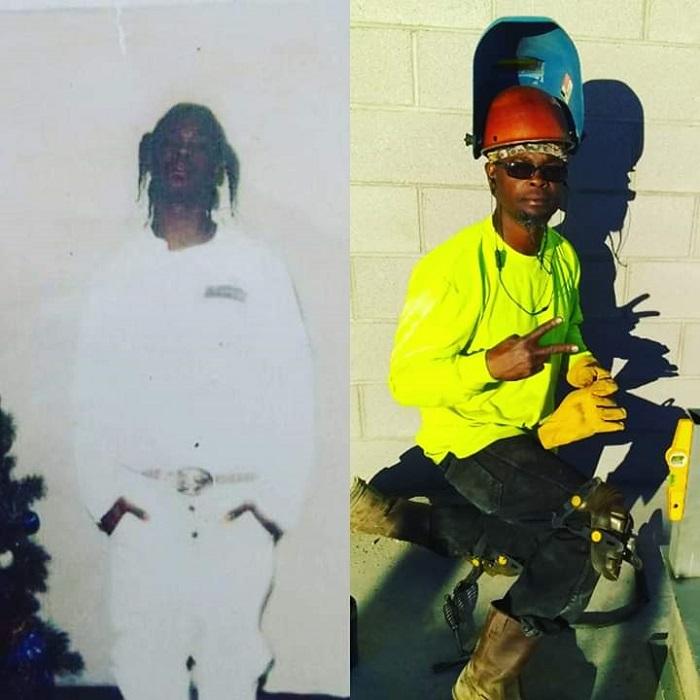
On the left: Joe Brown at 17 years old during first Christmas in Arkansas prison. On the right: Joe Brown at 39, welder and owner of Hog On Welding in Phoenix.
DW: What is the most challenging part of your job?
JB: I would have to say the most challenging part of my job is dealing with clients at times. I tend to get judged from my appearance and the way that I look, so a lot of times I send other people in to represent me. That way people can't judge me for being an African American in representing my culture with a long beard and gold teeth. A lot of my frustration has been from prejudiced people keeping a door closed on me. They don't have an issue with me coming in and doing the work, but if I say I am the owner, then it becomes an issue. However, I've learned to work around that and make ways for people to recognize my skill and their need for my product.
DW: Tell us about your vision for the Hip-Hop Welding Program! It’s such a creative approach to helping younger people achieve success.
JB: The vision for my Welding & Hip-Hop Program is to help minorities create a stable career path and teach them how to market and finance their hip-hop too. I almost threw in the towel on my hip-hop because of bad investments and people taking advantage of me. I knew there was money in it and that I had something, I just didn't know how to do it. Once I stepped back and focused on my welding more, I realized how I could kill two birds with one stone. I could support my hip-hop with my welding career. That’s when I began to realize that I could duplicate myself.
There’s a big need for welders in today's society, so I wanted to teach welding to others who also have hip-hop aspirations. I aim to teach my students how to build their welding careers, get certified, and be independent and financially stable. Along with that I teach how to release a record properly. How to get your copyrights, your ASCAP or BMI. Most independent artists just know how to create the music; they don’t know how to do the business. I've been fortunate to learn both.
I believe the younger generation will gravitate to this movement more and more – it will catch their attention. Not everyone is meant to go to college, but everyone is meant to live a good life. I teach students how to make good money being an independent welder or even a welder working for someone else, and still have freedom. Fabrication and teaching is where my heart is.
DW: What is your future career goal?
JB: My future goal with welding is to teach others how to do the same thing that I have done – how to start their own independent businesses, how to obtain a career, and how to promote their products. I want to lead by example and live to be remembered. I realize if I can help a thousand people, then that thousand might help millions. And all of them will be getting their hog on because of me.
DW: What advice would you give your peers if they wanted to find a similar path? Not even just specifically doing exactly what you do, but in general?
JB: My advice to anyone that wants to be a welder or follow this path is that actions speak louder than words. As long as you're standing still, there will be no progress. Take that leap of faith. Invest in yourself. You don't need a college degree. You do need willpower. And don’t be afraid to ask for help.
Follow Brown and Hog On Welding on Instagram and Facebook. While you’re at it, grab a Hog On hoodie.
Check out more of the Still Building America series with stories and interviews from metal fabricators, welders, and small-business entrepreneurs.
subscribe now

The Fabricator is North America's leading magazine for the metal forming and fabricating industry. The magazine delivers the news, technical articles, and case histories that enable fabricators to do their jobs more efficiently. The Fabricator has served the industry since 1970.
start your free subscriptionAbout the Authors

Josh Welton
Owner, Brown Dog Welding
(586) 258-8255
- Stay connected from anywhere

Easily access valuable industry resources now with full access to the digital edition of The Fabricator.

Easily access valuable industry resources now with full access to the digital edition of The Welder.

Easily access valuable industry resources now with full access to the digital edition of The Tube and Pipe Journal.
- Podcasting
- Podcast:
- The Fabricator Podcast
- Published:
- 04/16/2024
- Running Time:
- 63:29
In this episode of The Fabricator Podcast, Caleb Chamberlain, co-founder and CEO of OSH Cut, discusses his company’s...
- Trending Articles
Capturing, recording equipment inspection data for FMEA

Tips for creating sheet metal tubes with perforations

Are two heads better than one in fiber laser cutting?

Supporting the metal fabricating industry through FMA

Omco Solar opens second Alabama manufacturing facility

- Industry Events
16th Annual Safety Conference
- April 30 - May 1, 2024
- Elgin,
Pipe and Tube Conference
- May 21 - 22, 2024
- Omaha, NE
World-Class Roll Forming Workshop
- June 5 - 6, 2024
- Louisville, KY
Advanced Laser Application Workshop
- June 25 - 27, 2024
- Novi, MI
























